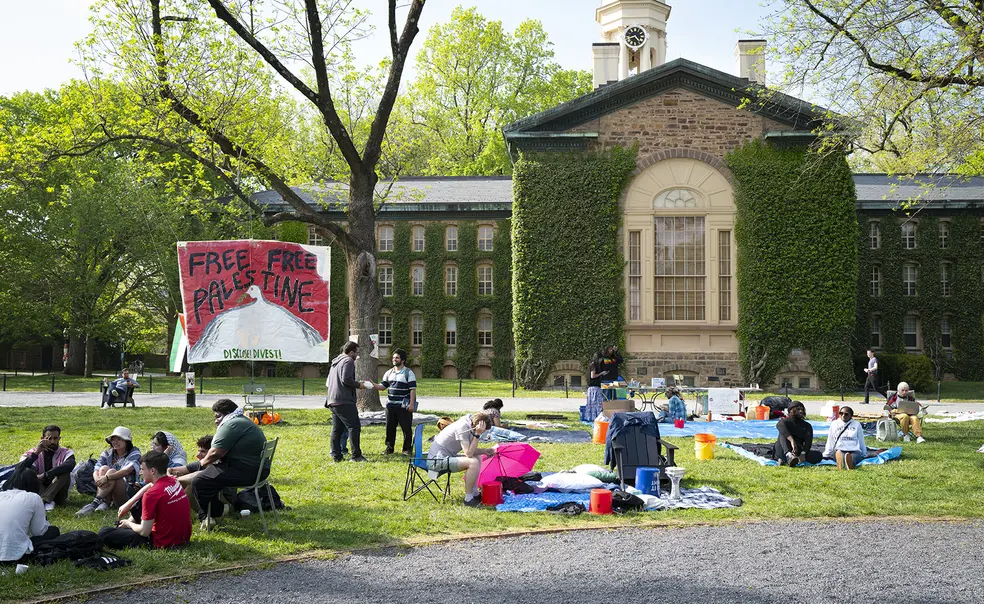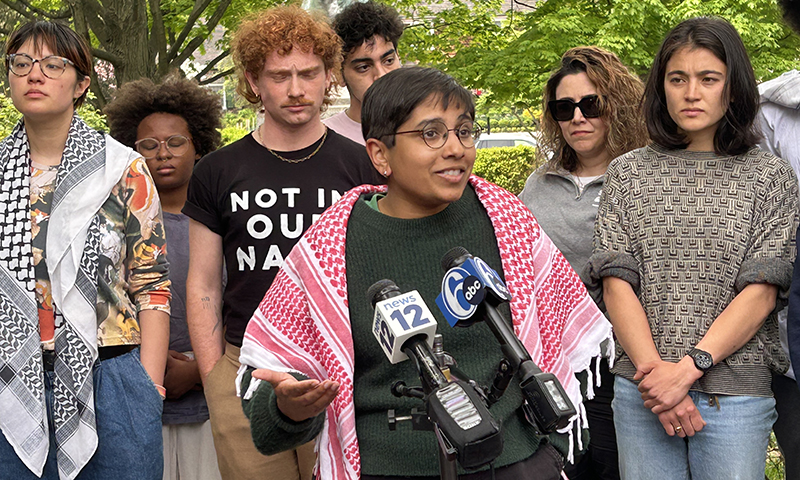Campus Protesters Move to Cannon Green But Stay on Message
In recent years, Nassau Street has seldom seemed like a bigger Princeton dividing line than yesterday.
Condemning Princeton University for declining to negotiate with them, a defiant group that included most of the 15 protesters who have been arrested so far in pro-Palestinian demonstrations vowed to continue their efforts until all their demands are met. The group spoke at a news conference Tuesday afternoon called by the group Princeton Israeli Apartheid Divest (PIAD) and held in Palmer Square because the University barred the arrested students from campus.
In an email to undergraduates Tuesday evening, Vice President for Campus Life Rochelle Calhoun wrote that the arrested students would face University disciplinary action “that may lead to suspension, the withholding of degrees, or expulsion.” Calhoun added that University also will not ask local prosecutors to drop any criminal charges that may be filed against the students. Her email followed a message to the entire campus community from President Christopher Eisgruber ’83 in which he called Monday’s brief occupation of Clio Hall “completely unacceptable.”
Meanwhile, the pro-Palestinian protesters moved their encampment Monday evening from McCosh Courtyard, which they had occupied since April 25, to Cannon Green behind Nassau Hall.
The press conference in front of the tiger statue in Palmer Square drew film crews from two area TV stations as well as Al-Jazeera. Students, who primarily read from prepared statements as they took turns narrating their account of Monday’s events, said that they had occupied Clio Hall peacefully, accompanied by Ruha Benjamin, a professor in the Department of African American Studies who was present as a “legal and faculty observer.” An unspecified number of other faculty members also entered Clio Hall to provide encouragement but did not join students who had barricaded themselves in an upstairs room, added graduate student Aditi Rao, who was one of those arrested. A video clip on X showed associate classics professor Dan-El Padilla Peralta ’06, along with Benjamin, leaving Clio Hall shortly before a deadline to vacate. Max Weiss, an associate professor of history, addressed a crowd outside through a bullhorn.
“All 13 of us were arrested, processed just five feet away from the University’s access, diversity, and inclusion offices, and charged with criminal trespass,” said Khari Franklin ’24.
Jacob Neis, a graduate student, said that protesters were left with no alternative but to occupy the building. “The University refused to meet with us using the proper channels, so we had to find our own,” Neis said. “We will be here until the administration meets with us.”
Asked if the group had plans to occupy any other buildings, Rao said, “We are barred from campus, but we don’t police the actions that other individuals may choose to take.”
The students arrested Monday include:
- Five undergraduates: Franklin, Andres Blanco Bonilla ’24, Kristal Grant ’24, Brooklyn Northcross ’24, and Sara Ryave ’24 — all seniors in the Department of African American Studies;
- Six graduate students: Neis, Rao, Christian Bischoff ’19, Ariel Munczek Edelman, Sofia Menemenlis, and Hellen Wainaina;
- Sam Nastase, a postdoctoral researcher, and Christian Silva, a student at Princeton Theological Seminary who is taking a course at the University.
Two other graduate students — identified in a document shared by protesters as Achinthya Sivalingam and Hassan Sayed — were also arrested in McCosh Courtyard on the first morning of the demonstrations. They also joined the news conference, although they did not speak.
The rhetoric in Palmer Square could hardly have been more different from the actions across Nassau Street, on Cannon Green, which was quiet for most of the day Tuesday. Only about a dozen protesters were present on a chilly morning that saw temperatures drop into the 50s, although their numbers grew to several dozen by lunchtime as the weather improved. The grass was covered with tarps, blankets, and yoga mats, while a pile of bed rolls was stacked under a tree. The Revolutionary War cannon in the center of the Green was framed by a bouquet of white peonies and a handwritten sign that read: “In our lifetimes, Palestine will be free and Korea will be one.”
All around the protesters, though, campus life went on as usual. In fact, anyone standing on the front side of Nassau Hall would not have been aware that there was a protest going on. A small number of Department of Public Safety officers stood quietly on patrol. Foot traffic was unimpeded and work went on at the nearby art museum construction site. Two of the buildings facing Cannon Green — Clio Hall, home of the graduate school admissions office, and Morrison Hall, home to the Department of African American Studies — were locked, although Whig, East Pyne, and Nassau halls were open.
Whether the encampment ever runs out of energy, it is unlikely to run out of food. Tables were laden with water bottles and the sorts of snacks students would usually be eating during reading period, including potato chips, popcorn, Pop Tarts, bagels, and boxes of Dunkin’ Donuts coffee. At one point, a supporter arrived with several large breakfast casseroles in aluminum pans, and later, a van from Olives of Princeton pulled up with a food delivery. Much of the food has been donated by sympathetic town residents and alumni, protesters said. One of the day’s planned activities was to write them thank-you notes.
At a “mic check” at 9:40 a.m., a grad student leader wearing a yellow vest engaged a small group, which still did not seem fully awake, in a desultory call-and-response chant, saying, “Good morning! And welcome to our new home. We have a lot of space, so please invite some friends. The administration doesn’t like us entering the buildings, so we’ll wait outside. We’ll be visible. And we’ll be loud!”
Except, they weren’t. Perhaps it was exhaustion following the brief burst of chaos Monday night. Perhaps it was because Rao and several other of the protest’s more vocal leaders had been barred from campus. Perhaps it was because undergraduate exams are approaching. But although the offices of Eisgruber and many other top University administrators were only a few yards away, the protesters were quiet.
Students began to occupy Cannon Green Monday evening after the attempted takeover of Clio Hall, and in a short period a decision was made to move everyone over from McCosh Courtyard. The switch did not go over well with everyone. Asked who had made the call, a young man with a keffiyeh draped over his shoulders, who asked to be identified only by his first name, John, replied, “Someone with too much power.” Moving to Cannon Green, he said, left the protesters “exposed on all sides” and exposed to the elements, as well, leaving them without much shade and far from a Reunions tent in McCosh Courtyard where many had taken shelter during weekend rains.
At mid-morning, a reporter from a Philadelphia TV station wandered through the encampment looking for someone to interview. Tom Abi Samra, a second-year graduate student in the Department of Near Eastern Studies and one of the few protesters willing to give his full name, obliged. Asked whether the group’s goals had changed after the aborted Clio Hall sit-in, he declared, “We will be here until Princeton discloses and divests.”
Still another perspective on the weeklong protests was offered by two people who are neither University students nor alumni.
Twelve hours after the encampment left McCosh Courtyard, Marty, a local electrical contractor doing work on campus, sat in a lawn chair near the sundial and ate his breakfast. “At least they were peaceful,” he said of the students. “They didn’t even leave any trash.”
Back at Cannon Green, a Public Safety officer who requested anonymity because he is not authorized to speak to the news media, echoed that sentiment.
“I know many of them,” he said of the protesters. “These kids work so hard.” Not only had most of the students treated him and his colleagues well, several of them had even offered to share their spare food.
“They’re our future leaders,” the officer said, looking over at the encampment. “If there’s going to be change, it’s got to start here.”













1 Response
Bill Hewitt ’74
1 Year AgoA Call to Investigate Faculty Involvement at Clio Hall
I am a frequent and sharp critic of President Eisgruber ’83 and his administration. That said, I highly commend the actions of President Eisgruber and his administration to summon the police to restore order at Clio Hall following its April 29 takeover by protestors. The University’s prompt and effective response here averted the development of an even more disruptive and dangerous situation. The delay and inaction at Columbia and UCLA, for example, resulted in the much longer occupation by protesters of Columbia’s landmark Hamilton Hall and the hours-long melee on UCLA’s campus. The boldly contrasting results at Princeton demonstrate the wisdom and resolve of Princeton’s leaders on the Clio Hall confrontation.
Further, I call upon the University to investigate fully the self-admitted involvement of four University faculty members inside Clio Hall during the April 29 takeover. Professor Ruha Benjamin later asserted publicly that these four acted as mere “faculty observers.” But a contemporaneous announcement from the Clio Hall steps by protest supporter Professor Max Weiss (who did not enter) identified Benjamin by name as having “occupied this building.” President Eisgruber and his administration must resolutely enforce all University rules that this investigation may show to have been breached at Clio Hall.
I urge all interested Princetonians to review and join the full petition on these matters at http://tiny.cc/cliopetition.